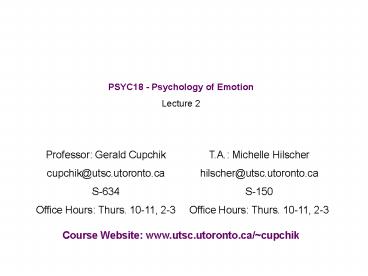PSYC18 Psychology of Emotion - PowerPoint PPT Presentation
1 / 8
Title:
PSYC18 Psychology of Emotion
Description:
Shifting viewpoints (engaged versus detached) Engaged (absorbed in our experiences) Detached (outside of our experiences) Can we unify these viewpoints? Actions ... – PowerPoint PPT presentation
Number of Views:75
Avg rating:3.0/5.0
Title: PSYC18 Psychology of Emotion
1
PSYC18 - Psychology of Emotion Lecture 2
Professor Gerald Cupchik cupchik_at_utsc.utoronto.ca
S-634 Office Hours Thurs. 10-11, 2-3
T.A. Michelle Hilscher hilscher_at_utsc.utoronto.ca
S-150 Office Hours Thurs. 10-11, 2-3
Course Website www.utsc.utoronto.ca/cupchik
2
- How do we see ourselves?
- Are we objects or processes? (Are we static or
dynamic?) - Can we change or are we burdened by our personal
histories? - Literal viewpoint (externalized view)
- As objects with featuresgradesstatusmoney
- (Closed process)
- Ironic or metaphorical viewpoint
- See ourselves in context, changing
- (Open process)
- Shifting viewpoints (engaged versus detached)
- Engaged (absorbed in our experiences)
- Detached (outside of our experiences)
- Can we unify these viewpoints?
3
Actions
Reactions
4
WORLDS AGAIN...
Inside one body affected by the outside world
yet shaped by a personal existence. Are you
showing how you feel inside? ADAPTATION and
EXPERIENCE are both a two-way street - challenged
and shaped by the outside world yet interpreted
in a personal way.
5
TWO ESSENTIAL COMPLEMENTARITIES (1) Forms of
Knowledge Objective Subjective Objective
knowledge is supposedly about the external public
world BUT it actually reflects internal learned
conventions and standards. Subjective knowledge
is supposedly about the internal private world
BUT it is actually projected onto the imagined
world out there.
6
(2) Modes of being in the world
7
BUT - LETS TAKE A LOOK AT THE BIG PICTURE! You
cannot have thoughts without feelings You also
cannot emotions without thoughts The question
then is this What kind of thought processes go
with what kind of feeling processes when it comes
to ADAPTATION and EXPERIENCE? This is the central
question addressed by the course! How do the
mind and body interact to shape adaptation and
experience or the search for meaning?
8
METHOD Examining episodes in everyday life
Self as object Self as process The search for
process Acts of Noticing as applied to everyday
life Apperception in the world being and
acting in the world in context and aware of it!































